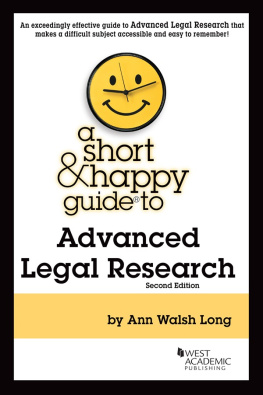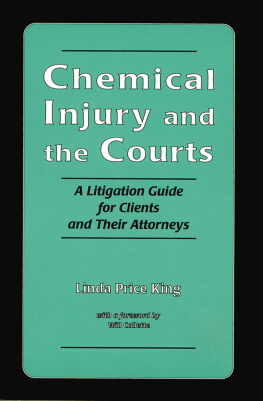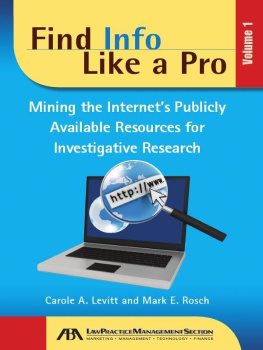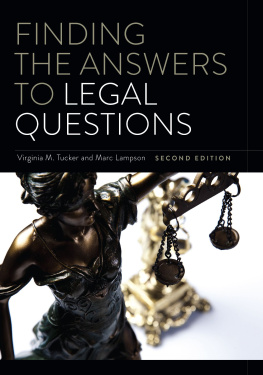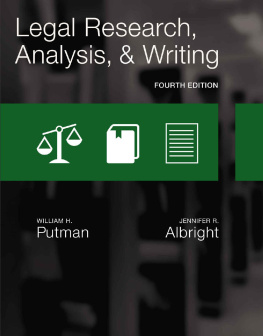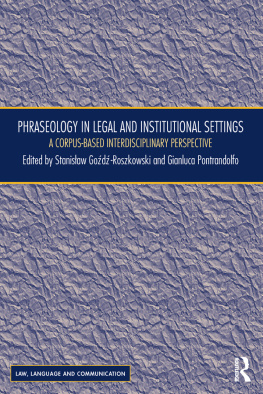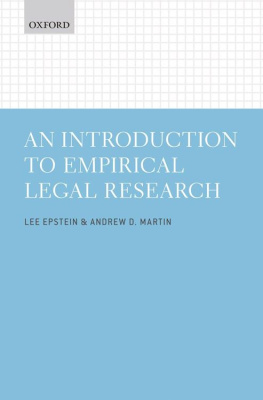West Academic Publishings Emeritus Advisory Board
Jesse H. Choper
Professor of Law and Dean Emeritus
University of California, Berkeley
Yale Kamisar
Professor of Law Emeritus, University of San Diego
Professor of Law Emeritus, University of Michigan
Mary Kay Kane
Late Professor of Law, Chancellor and Dean Emeritus
University of California, Hastings College of the Law
Larry D. Kramer
President, William and Flora Hewlett Foundation
James J. White
Robert A. Sullivan Emeritus Professor of Law
University of Michigan
West Academic Publishings Law School Advisory Board
Joshua Dressler
Distinguished University Professor Emeritus
Michael E. Moritz College of Law, The Ohio State University
Meredith J. Duncan
Professor of Law
University of Houston Law Center
Rene McDonald Hutchins
Dean and Joseph L. Rauh, Jr. Chair of Public Interest Law
University of the District of Columbia David A. Clarke School of Law
Renee Knake Jefferson
Joanne and Larry Doherty Chair in Legal Ethics &
Professor of Law, University of Houston Law Center
Orin S. Kerr
Professor of Law
University of California, Berkeley
Jonathan R. Macey
Professor of Law,
Yale Law School
Deborah Jones Merritt
Distinguished University Professor,
John Deaver Drinko/Baker & Hostetler Chair in Law
Michael E. Moritz College of Law, The Ohio State University
Arthur R. Miller
University Professor and Chief Justice Warren E. Burger Professor of
Constitutional Law and the Courts, New York University
Grant S. Nelson
Professor of Law Emeritus, Pepperdine University
Professor of Law Emeritus, University of California, Los Angeles
A. Benjamin Spencer
Dean & Chancellor Professor of Law
William & Mary Law School

Advanced Legal Research
Second Edition
Ann Walsh Long
Head of Research & Digital Collections
Associate Professor of Law
Lincoln Memorial University School of Law
A SHORT & HAPPY GUIDE SERIES

The publisher is not engaged in rendering legal or other professional advice, and this publication is not a substitute for the advice of an attorney. If you require legal or other expert advice, you should seek the services of a competent attorney or other professional.
a short & happy guide series is a trademark registered in the U.S. Patent and Trademark Office.
2020 LEG, Inc. d/b/a West Academic
2021 LEG, Inc. d/b/a West Academic
444 Cedar Street, Suite 700
St. Paul, MN 55101
1-877-888-1330
Printed in the United States of America
ISBN: 978-1-68467-545-6
iii
For Jeremy and Abigail
v
Acknowledgments
Thanks to all the law librarians I have learned from and worked with over the years. Thanks also to all the law librarians who amaze and inspire memany of whom I have tried to formally recognize for their efforts in this book.
Special thanks to Jeremy Long, Bianca White, Gordon Russell, Akram Faizer, Allison Starnes-Anglea, Melanie Reid, Eric Voigt, Jerry Lawson, Donna Bausch, Sabrina Pacifici, and my Ikon ski pass.
vii
Introduction
Historically, legal research courses have taught law students how to find binding and persuasive sources of primary law. Students also learn about secondary sources of legal information that help them learn more about a particular subject area or forms and checklists that assist with the practice law. However, in 2019, the legal research world changed dramatically when litigation analytics features and artificial intelligence (AI) options were introduced and integrated into legal research platforms. Now, legal research includes data gleaned from court dockets and the associated analytics can be useful for preparing a litigation strategy.
Advanced Legal Research courses typically provide a survey of subject-specific resources held by the academic law school library where the course is taught. Using a similar survey method, A Short and Happy Guide to Advanced Legal Research provides a survey of the civil litigation content available in the academic licenses of Bloomberg Law, Fastcase, Lexis+, and Westlaw Edge. The litigation analytics features and artificial intelligence enhancements are discussed along with a suggestion on which stage of civil litigation they will be the most useful.
A Short and Happy Guide to Advanced Legal Research could be used as a text for an Advanced or Practical Legal Research course, as a supplement to a traditional legal writing or experiential/simulation course with a research component, or as a reference book to accompany a Continuing Legal Education seminar. In each chapter, research scenarios are provided to demonstrate how to find the resources necessary at each stage of the civil litigation process, i.e. , Phase I: Case Assessment and Development; Phase II: Discovery and Investigation; and Phase III: Pretrial Action. Examples include content from the three major research databases (Bloomberg Law, Lexis+, and Westlaw Edge), low-cost resources viii (such as Fastcase), and authoritative free Internet resources. The emphasis will be on how to find the necessary information in the most time and cost-efficient manner.
My former life as a law firm librarian has prepared me to teach legal research in a manner few other law librarians and writing professors can. I have nearly thirty years of experience teaching and conducting legal research. During this time, I have worked at four large law firms and worked with hundreds of summer associates, new associates, and equity partners. Additionally, I have taught Continuing Legal Education seminars on free and low-cost legal research resources throughout the country for decades. My experience has taught me that legal research is not always a one-size fits all approach. Rather, your needs change depending on what you need and when you need it. Moreover, who your client is and what legal research resources you have access to may limit your options.
In practice, most lawyers will not have the benefit of having access to a librarian working in their law firm, in the same way librarians are available in law school. As such, this book is also intended to serve as a guide for solo and small law firm lawyers when it is time to negotiate or renegotiate a flat-rate contract with Bloomberg Law, Lexis+, or Westlaw Edge. Without access to a librarian who has the time and expertise to compare and contrast the content and various features each legal research service offers, many attorneys continue using a service they are comfortable with rather than considering a new research service that may be better for their practice, based on the types of cases they handle in their jurisdiction.
Like so many things in life, legal research requires choices. When you have more time than money, you can look for good and cheap resources. When you have more money than time, you can look for good and fast resources. The resources I have discussed in ix this book are all good , but many are not free. In each chapter, I will discuss what makes a resource good , cheap , and/or fast . When a resource is cheap , it is free or low-cost. When a resource is fast , it is available online from your desktop or it provides a comparably huge savings in time. The litigation analytics features are included with a flat-rate contract and will help provide more information on your particular case type, court, and judge, which will help inform your litigation strategy.

